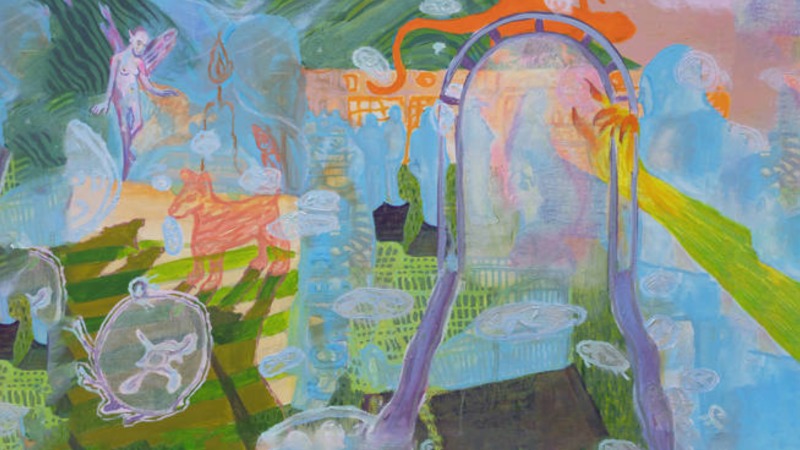On Jellywish, Florist Take Refuge In-Between Extremes
The New York band’s fifth album drops the ambient textures of its self-titled predecessor, forging a folk wonderland touched by flourishes of robust instrumentalism and Emily Sprague’s deeply meditative, existential lyricism.

Florist, like Mount Eerie and Elliott Smith before them, write music scored by heavy feelings, existential ideas, and the confrontation of mortality that, again, paints the corners of their latest record, Jellywish. Similar to the title’s mythic creation—a clash between a jellyfish’s liquidity and a wish’s intangibility and optimism—Jellywish exists in a space between extremes: life and death, joy and sadness, acceptance and denial. It’s a fabled place where these ideas can exist together in totality.
The New York-based folk quartet have known each other for over a decade. Endearingly described as a “friendship project” by bandleader Emily Sprague, Florist is the musical connection between her, Rick Spataro (bass/keys/engineer), Jonnie Baker (guitar), and Felix Walworth (drummer). The band didn’t fully bloom until 2015, upon the release of their excellent EP Holdly, but since then, their cup has been filled with five full-lengths, each of them building upon the intricacies and humanism of the last. Jellywish comes two-and-a-half years after Florist, a 19-track effort that found the band at their strongest and most hopeful, thanks to autobiographical songs like “Red Bird Pt. 2” and “Sci-Fi Silence” and the sample-motivated ambition of “Spring in Hours” and “Dandelion.”
Dropping the strictly ambient textures of Florist, Jellywish is a minimalist folk wonderland, making time for flourishes of robust instrumentalism and deeply meditative lyrics tilting towards life’s one certainty: uncertainty. These new songs are intimate in a manner that feels like a late-night existential conversation between close friends. This is reflected by the sparse arrangements from Sprague, Spataro, Walworth, and Baker, whose movements on the record mimic the mood in sound like a radio playing softly in the background, coloring in the pauses. The production is lightly touched, but the record leans greatly into Florist’s best asset: Sprague’s confessional songwriting. While some of the verses get jumbled in her stream-of-consciousness style, the stories still disarm, ache, and impress.
We are windswept into Sprague’s diarism by delicate acoustic picking and her own airy croons. “Levitate” opens with questions of purpose, love, and pain—overarching themes Sprague has grappled with throughout her career: “Every day I wake / Wait for the tragedy / Imbalanced humanity / Should anything be pleasure when suffering is everywhere / Is this life too long? / Or too short to have no want phenomenon,” she sings. It’s undoubtedly a blunt opener, but a scan, too, of hard truths on a record full of them.
-

-

-

-

-

-

-

-

-

-

-

-

-

-

-

-

-

-

-

-

-

-

-

-

-

-

-

-

-

-

-

-

-

-

-

-

-

-

-

-








































